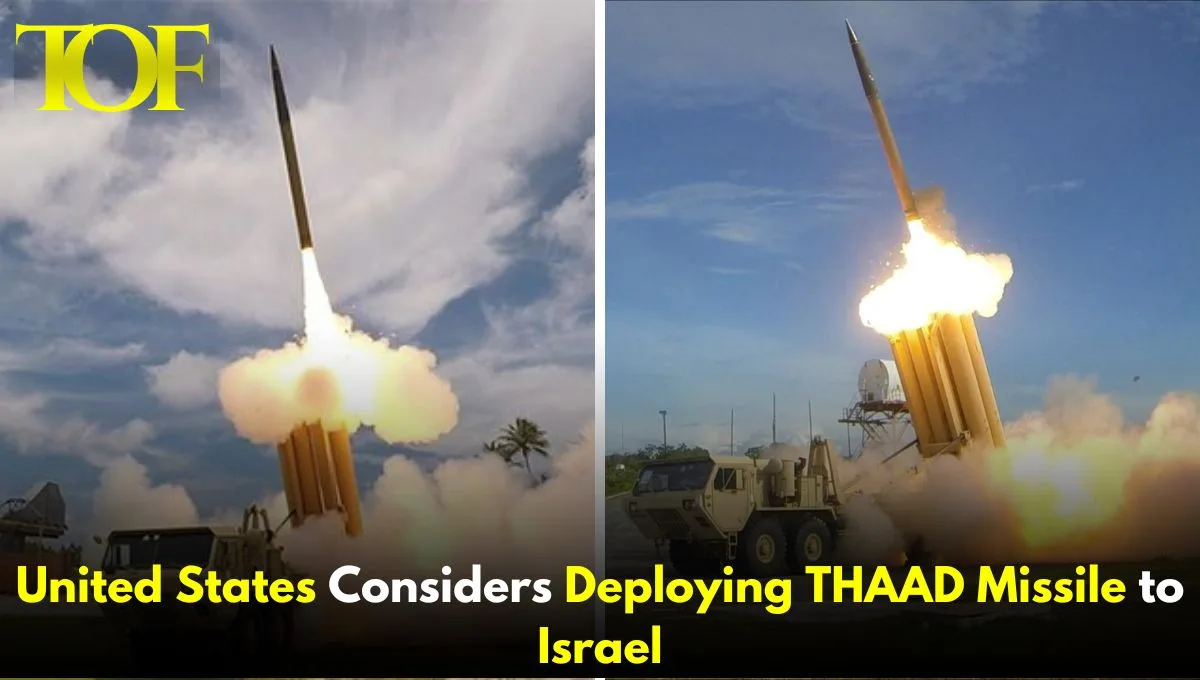THAAD Missile System
The United States is now contemplating sending a high-tech Terminal High Altitude Area Defense THAAD missile system to Israel, supposedly as an overture to deter Iran from retaliating. The tension between two sworn enemies was further escalated in recent times following an exchanged round of hostilities between both. This will call for embedding American servicemen to run this multi-layered defense system clear indication of how seriously the nation’s capital takes the currently spiraling tensions in that corner of the world.
The incident emanates from the fact that Iran has placed by launching approximately 200 ballistic missiles into Israel on October 1, stating that it was retaliatory to those Israeli strikes in Lebanon that targeted Hezbollah leaders. Israel declared its commitment to retaliation, while Iran warned that it would respond to any action by Israel in kind. The tit-for-tat escalation prompted the US to consider bolstering Israel’s missile defense capabilities to further minimize a similar worst-case scenario.
Israel has indicated narrowing down its focus in Iran primarily to military and energy infrastructure only with no signs that will suggest they target nuclear facilities. US officials have closely coordinated with Israel to temper the latter’s response so as not to ignite a wider conflict.
Adding the THAAD missile to Israel would be a significant step toward the commitment of the US to making sure its ally is secure with rising Iranian threats. Since THAAD missiles can intercept incoming ballistic missiles at altitude, this protection provides another vital layer of defense across an expansive area. This system would complement the existing Patriot missile batteries that the US has stationed in several locations across the Middle East.
Each THAAD missile battery would have multiple truck-mounted launchers, interceptors, radar, and communication equipment, requiring nearly 100 soldiers to operate it. At present, the US Army operates seven THAAD missile batteries around the world. Bringing one to Israel would necessitate careful strategic thinking to maintain continued defense readiness elsewhere.
It was not clear until now if the Biden administration would make a final decision on THAAD missile usage. However, American officials have officially declared that the transfer of such an advanced and technologically advanced defense asset would occur in conjunction with American personnel, thereby indicating the intensity of its technological complication and expertise.
As military plans keep moving ahead, the diplomatic endgame heats up. Iran has been appealing to regional powers, notably Saudi Arabia, Qatar, and the United Arab Emirates, to persuade the Israelis or Americans not to take military action. Iranian officials allegedly warned them that if their air space or territory was used by the Israelis or Americans to attack Iran, they would get hit back as retaliation.
Iran’s sustained efforts to gain either support or neutrality from key regional players continued with visiting Saudi Arabian Foreign Minister Abbas Araghchi last week. The Arab states of Saudi Arabia, Jordan, and the UAE all voiced their position to both the US and Iran; namely, they will not permit their airspace to be used in military strikes against Iran.
Coordinated cooperation between the US and Israel has been the core question of conversations lately, with the US adopting a tightrope approach in reminding Israel not to engage in the cycle of revenge that may go out of hand. Israel Prime Minister and US President Joe Biden addressed a phone call to talk over last week’s unfolding crisis and work towards a coalesced response over this conflict.
Israeli Defense Minister Yoav Gallant was going to pay a US visit, where he would discuss matters with his American counterpart Defence Secretary Lloyd Austin. But his visit to the US has been postponed because of further consultations within Israel’s security cabinet. This delay depicts the reserve shown by the leadership before taking a final decision to take retaliatory action.
Beyond the immediate Israel-Iran dynamic, however, developments here have also more profound, more general geopolitical implications – in the sense that Iran is trying to make its alliance with Russia harder to shift. Iranian President Masoud Pezeshkian met Russian President Vladimir Putin on a visit to Turkmenistan to discuss closer strategic ties. Both of them tried to strengthen their joint stance against Western influence in the region by saying it was best if the world became divided between East and West.
The further Iran and Russia bond with each other while striving to address the moves by the West could present a complicated situation since both are trying to find how to strengthen each other’s position on the global map. This alliance may pose a challenge to US diplomacy in efforts to isolate Iran and make it fail to gain more influence in the region.
As the US deliberates on stationing the THAAD missile system in Israel and sustains its diplomatic interactions, the Middle East remains volatile. American-operated defense systems deployed in Israel can serve as a significant deterrent against further attacks from Iran and missile attacks, but in doing so, it risks drawing the US into more hostilities in case the situation escalates.
Israel and Iran face pressure to exercise restraint in their next step to avoid an open-up conflict that may destabilize the region and draw in several global powers. In the meanwhile, all attention is left to take place with the already strategic talks between Washington and Jerusalem in the pursuit of resolving one of the sharpest flashpoints over the last years.
Read About U.S. Sanctions on Iran
To Read More: Global

